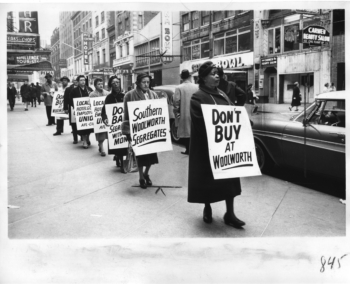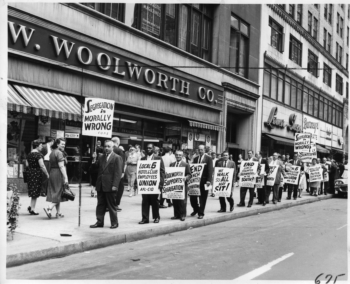HTC Pickets Woolworth in Times Square in Solidarity with Sit-Ins Across the South


In February 1960, four brave Black college students walked into a “whites only” lunch counter at a Greensboro, North Carolina Woolworth and sat down, igniting a protest movement to end segregation that spread across the country. The students – Ezell Blair Jr., David Richmond, Franklin McCain and Joseph McNeil – each ordered a cup of coffee and after being refused service, sat quietly in protest until the store closed. The student activists returned the next day in greater numbers and stoically bore the harassment and verbal abuse by white customers. By the third day, the number of peaceful protestors had swelled to the hundreds.
As the Greensboro sit-ins gained national attention, students across the South organized similar sit-ins at Woolworth and other segregated establishments. The activists were often met with aggression, police violence, and even bomb threats. In New York City, our Union organized a picket line of its own outside the Times Square Woolworth in solidarity with the civil rights activists.
April 1960: HTC organizes a robust picket line outside Woolworth in Times Square
On April 2, 1960, members of our Union turned out in the hundreds to picket Woolworth’s Times Square location and apply pressure on the company to end its policy of allowing segregation.
On the picket line, union members educated those who didn’t know about the segregation in the Southern Woolworth stores and convinced many passersby to join in. Among those who joined our Union’s picket line was actor Robert Earl Jones, who had learned of the protest on the radio. One New Yorker was reportedly brought to tears as he read the leaflets handed out by our members. He asked to take 100 to help distribute them among his friends and peers. By the end of the day, our members distributed more than 10,000 leaflets about segregation at Woolworth lunch counters.
June 1960: HTC honors the courage of student activists who organized the sit-ins
In June of 1960, in recognition of the bravery and resilience of the student organizers behind the sit-in movement, our Union invited student activist Priscilla Stephens to be a guest speaker at our Better Race Relations Award ceremony. Priscilla Stephens and her sister Patricia had organized a sit-in at the whites only Woolworth lunch counter in Tallahassee, Florida. Tallahassee police tear-gassed, arrested, and ultimately imprisoned the sisters and their fellow activists for 49 days for participating in the peaceful protest.
While in jail, Priscilla’s sister Patricia penned a letter about the city’s brutal response to the sit-ins, which was published in the June 1960 Hotel Voice.
"Our biggest demonstration took place on March 12 at 9 a.m. The plan was for FSU students, who are white, to enter the two stores first and order food. A& M students would arrive later and, if refused service, would share the food which the white students had ordered.
The white and Negro students were sitting peacefully at the counter when the mayor and his corps arrived. As on the previous occasion, he asked the group to leave, but when a few rose to comply, he immediately arrested them…
After the arrests many of us stood in a park opposite the station. We were refused permission to visit those arrested. I rushed back to report this on campus. We asked the president of the student body to mobilize the students for a peaceful march downtown. He agreed but first tried, without success, to arrange a conference with the mayor.
However the mayor was not too busy to direct the city, county and state police who met us as we neared the downtown area. There were 1,000 of us, in groups of 75 – each with two leaders. Our hastily printed posters said: “Give Us Our Students Back,” “We will Not Fight Mobs,” “No Violence,” “We Want Our Rights: We Are Americans Too.”
As we reached the police line-up the mayor stepped forward and ordered us to disperse within three minutes. But the police did not wait: They started shooting tear gas bombs at once. One policeman, turning on me, explained: “I want you!” and thereupon aimed one of the bombs directly at me.
The students moved back toward campus. Several girls were taken to the university hospital to be treated for burns. Six students were arrested, bringing the total arrests for the day to 35.”
Patricia Stephens suffered lasting damage to her eyes after the gassing by police. While horrifying, her account of the police’s violent response to the sit-ins was – and remains - all too common. Over the summer, we saw the same pattern of violence against people protesting the killings of George Floyd and Breonna Taylor.
Patricia ended her letter from jail by voicing her commitment to keep fighting for racial equality “I plan to carry on this struggle” she wrote, “I feel I shall be ready to go to jail again if necessary.”
Her words serve as a reminder to us all that progress does not come easily, nor does it happen overnight. It would take six months from the start of the sit-ins, until July 1960, for Woolworth to cave and finally ban segregation in its Southern stores and four more years, until 1964, for the passage of the Civil Rights Act and a national prohibition of segregation in all public places.
We are proud to have answered Patricia and the student activists’ call to action in 1960, and to continue to fight for racial and workplace justice today.


